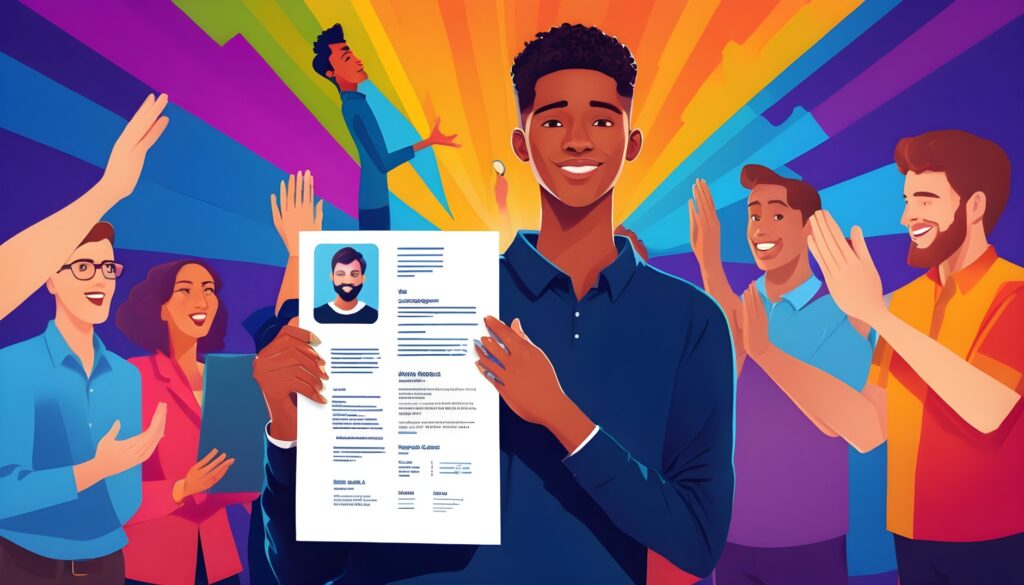In today’s competitive job market, landing your dream job can feel like an impossible feat, especially when faced with the age-old dilemma of needing experience to secure a job, but needing a job to gain that valuable experience. This Catch-22 scenario leaves many aspiring professionals feeling stuck in a perpetual cycle of frustration and uncertainty. Let us dive into the 11 professional strategies that will help you land your first job even when you have a resume with no experience.
The Catch-22 of Resume Writing
However, amidst this challenging landscape, there exists a powerful tool that has the potential to break this cycle and pave the way for career success: the well-crafted resume. Your resume serves as your personal marketing tool, showcasing your skills, experiences, and qualifications to potential employers. In essence, it’s your first opportunity to make a lasting impression and stand out from the competition.
Crafting a captivating resume is not just about listing your past experiences; it’s about strategically presenting yourself in a way that resonates with hiring managers and recruiters.
In this guide, we’ll explore key strategies for creating an impactful resume, starting with the crucial first step: crafting a captivating resume objective statement.
1. Craft a Captivating Resume Objective Statement
Traditionally, resume objective statements were used to convey an applicant’s career goals and aspirations. However, in recent years, there has been a shift towards using summary statements instead. Unlike objective statements, which focus on the candidate’s goals, summary statements provide a concise overview of the candidate’s skills, experiences, and value proposition to potential employers.
The purpose of a summary statement is to grab the attention of hiring managers and recruiters right from the start. It serves as a snapshot of your professional identity, highlighting your key strengths and qualifications in a succinct manner. By crafting an effective summary statement, you can pique the interest of hiring managers and compel them to continue reading your resume.
Here are some examples of effective summary statements:
- “Results-oriented marketing professional with over 5 years of experience driving successful marketing campaigns for Fortune 500 companies. Proven track record of exceeding targets and delivering measurable results. Skilled in strategic planning, market analysis, and campaign optimization.”
- “Dynamic and resourceful project manager with a strong background in leading cross-functional teams to deliver projects on time and within budget. Excellent communication and problem-solving skills. Recognized for driving process improvements and enhancing project efficiency.”
- “Highly motivated recent graduate with a degree in computer science and a passion for software development. Proficient in Java, Python, and C++. Strong problem-solving abilities and a quick learner with a desire to contribute to innovative projects in the tech industry.”
2. Choose the Right Resume Format
In the world of resume writing, choosing the right format is crucial to effectively showcase your skills and experiences, especially when you’re crafting a resume with no work experience. There are three main resume formats to consider: chronological, functional, and hybrid. Each format has its own unique advantages and is suitable for different types of job seekers.
Chronological Resume Format
The chronological resume format is the most traditional and widely used format. It focuses on listing your work experiences in reverse chronological order, starting with your most recent job or education and working backward. This format is ideal for candidates with a solid work history and a clear career progression.
Functional Resume Format
The functional resume format, on the other hand, emphasizes your skills and abilities rather than your work history. It allows you to highlight specific skills relevant to the job you’re applying for, making it a great choice for individuals with limited work experience or those looking to make a career change.
Hybrid Resume Format
The hybrid resume format, also known as the combination resume format, combines elements of both the chronological and functional formats. It allows you to showcase your skills and experiences while also providing a chronological overview of your work history. This format is versatile and can be tailored to highlight your strengths and qualifications effectively.
When choosing the right resume format for individuals with no work experience, it’s essential to consider your specific circumstances and the requirements of the job you’re applying for. In most cases, a functional or hybrid resume format may be more suitable, as it allows you to focus on your skills and abilities rather than your work history.
Regardless of the format you choose, consistency is key. Ensure that your resume follows a consistent format throughout, including consistent formatting, font styles, and spacing. This creates a professional and cohesive appearance that will impress potential employers and make your resume stand out from the crowd.
3. Pay Attention to Detail in Your Resume
When you’re crafting a resume with no work experience, attention to detail is paramount. A single typo or grammatical error can undermine your credibility and detract from your qualifications. Therefore, it’s crucial to thoroughly review and edit your resume to ensure it is error-free and polished.
Punctuation, grammar, and phrasing play a significant role in maintaining a professional appearance in your resume. Use proper punctuation and grammar to convey your message clearly and effectively. Avoid using overly complex or convoluted phrasing, as this can confuse readers and detract from the clarity of your resume.
Seeking feedback from others can also be incredibly helpful in catching any overlooked mistakes or areas for improvement. Ask a friend, family member, or mentor to review your resume and provide constructive feedback. Fresh eyes can often spot errors or inconsistencies that you may have missed, helping you create a more polished and professional resume.
4. Keep Track of Accomplishments and Activities
When crafting a resume with no work experience, it’s essential to focus on highlighting your accomplishments and activities outside of traditional employment. This includes internships, extracurriculars, volunteer work, and other relevant experiences that demonstrate your skills and abilities.
Creating a Comprehensive List
Start by brainstorming a comprehensive list of all your experiences, including any internships, extracurricular activities, volunteer work, projects, or academic achievements. Don’t underestimate the value of these experiences – they can provide valuable insights into your capabilities and work ethic.
Filtering and Tailoring
Once you have a list of experiences, it’s important to filter and tailor this list based on each job application. Review the job description carefully and identify the key skills and qualifications required for the position. Then, select the most relevant experiences from your list and highlight them on your resume. This targeted approach ensures that your resume is tailored to the specific job you’re applying for, increasing your chances of success.
Examples of Relevant Accomplishments and Activities
- Internship at a local marketing agency: Developed social media marketing campaigns that increased engagement by 30%.
- Volunteer work at a homeless shelter: Organized fundraising events that raised $5,000 for shelter renovations.
- Leadership role in a student organization: Coordinated a team of 20 members to organize campus events, demonstrating strong organizational and leadership skills.
Highlighting these accomplishments and activities on your resume showcases your initiative, dedication, and ability to succeed in a professional environment, even without traditional work experience.

5. Focus on Education and Transferable Skills
In the absence of work experience, the education section of your resume becomes even more critical. This is where you can highlight your academic achievements, relevant coursework, and transferable skills gained through education.
Expanding the Education Section
Expand on the education section of your resume to include details such as your degree, major, university attended, and graduation date. Additionally, consider including relevant coursework that demonstrates your expertise in key areas related to the job you’re applying for.
Showcasing Transferable Skills
Transferable skills are those that can be applied across various industries and job roles. These skills are often gained through education and can include communication, teamwork, problem-solving, and time management. Use your education section to showcase these transferable skills and demonstrate how they align with the requirements of the job you’re applying for.
Linking Education to Job Requirements
When discussing your education and transferable skills on your resume, make sure to explicitly link them to the job requirements listed in the job description. For example, if the job requires strong communication skills, highlight relevant coursework or experiences that demonstrate your proficiency in this area.
By focusing on your education and transferable skills, you can effectively compensate for a lack of traditional work experience and position yourself as a strong candidate for the job. Highlighting your academic achievements and relevant skills demonstrates your readiness and ability to excel in the workplace, making you an attractive candidate for potential employers.
6. Leverage College Internships for Real-World Experience
Internships during college are invaluable opportunities to gain real-world experience, whether paid or unpaid. These experiences provide a unique chance to apply classroom knowledge in a professional setting, develop new skills, and build a network of industry contacts.
Stressing the Value of Internships
Including internships on your resume demonstrates to potential employers that you have practical experience and a strong work ethic, even if you haven’t held traditional full-time positions. Whether it’s a summer internship, part-time internship during the school year, or a semester-long program, each experience adds depth to your resume and showcases your readiness for the workforce.
Encouraging Inclusion on Resumes
When listing internships on your resume, be sure to highlight key responsibilities, projects, and accomplishments. This not only demonstrates your contributions during the internship but also provides concrete examples of your skills and abilities in action. Even if the internship was unpaid, the experience gained is still valuable and worth showcasing.
Highlighting Dual Benefits
In addition to gaining practical experience, internships offer the opportunity to build a professional network. Connecting with professionals in your field can lead to mentorship opportunities, job referrals, and valuable insights into the industry. Including internships on your resume not only showcases your work experience but also demonstrates your commitment to professional development and growth.
7. Showcase Extracurricular and Volunteer Activities
Extracurricular activities and volunteer experiences are often overlooked but can be powerful additions to your resume, especially when you have no traditional work experience. These activities demonstrate important transferrable skills, such as leadership, teamwork, and time management, which are highly valued by employers.
Significance of Volunteer Experiences
Volunteer experiences showcase your commitment to giving back to the community and can provide valuable opportunities to develop skills and make meaningful contributions. Whether it’s volunteering at a local charity, participating in community service projects, or serving in a leadership role within a volunteer organization, these experiences demonstrate your character and values to potential employers.
Demonstrating Transferrable Skills
Extracurricular activities, such as involvement in student organizations, sports teams, or campus clubs, can also demonstrate important transferrable skills. For example, serving as a team captain for a sports team showcases leadership and teamwork skills, while organizing events for a student organization demonstrates organizational and communication abilities. Highlighting these experiences on your resume allows you to showcase a diverse skill set and demonstrate your readiness for the workforce.
Examples of Relevant Activities
- Volunteering at a local animal shelter: Demonstrates compassion, responsibility, and teamwork.
- Serving as president of a student organization: Highlights leadership, organizational skills, and ability to manage projects and teams effectively.
- Participating in a community service trip: Shows dedication to community involvement and cultural awareness.
Including these extracurricular and volunteer activities on your resume allows you to paint a well-rounded picture of your skills, interests, and values to potential employers, even in the absence of traditional work experience.
8. Avoid Including Irrelevant Items
When crafting a resume with no traditional work experience, it’s essential to focus on relevant information that highlights your skills and qualifications. Avoid including items that are unnecessary or could potentially detract from your resume’s effectiveness.
Items to Avoid
- Writing Samples: Unless specifically requested by the employer, writing samples should not be included on a resume. Instead, focus on showcasing your writing skills through concise and well-written descriptions of your experiences and accomplishments.
- Images: Including images on a resume is generally discouraged, as they can take up valuable space and may not be compatible with applicant tracking systems (ATS). Stick to text-based formats to ensure your resume is easily readable and accessible.
- Irrelevant References: References should only be included if explicitly requested by the employer. Avoid listing references that are unrelated to the job you’re applying for, as they add unnecessary clutter to your resume.
Importance of Conciseness
Maintaining a concise and focused resume is crucial, especially when you have no traditional work experience to draw from. Use bullet points and concise language to highlight your skills, accomplishments, and qualifications. Avoid including irrelevant details that do not contribute to your overall candidacy.
Creating a Professional Email Address
When applying for jobs, it’s important to use a professional email address that reflects your name or initials. Avoid using unprofessional or outdated email addresses that may give the wrong impression to potential employers. Consider creating a new email address specifically for job applications if your current address is not suitable.

9. Optimize for Applicant Tracking Systems (ATS)
In today’s digital age, many employers use applicant tracking systems (ATS) to screen and filter resumes before they reach human recruiters. To increase your chances of getting noticed by these systems, it’s essential to optimize your resume with relevant keywords and formatting.
Prevalence of ATS
Applicant tracking systems are widely used in the hiring process to streamline the recruitment process and manage a large volume of applicants. These systems scan resumes for keywords and phrases that match the job description, making it crucial to tailor your resume for each position you apply for.
Inclusion of Relevant Keywords
To optimize your resume for applicant tracking systems, carefully review the job description and identify key words and phrases related to the position. Incorporate these keywords strategically throughout your resume, particularly in the skills, experience, and education sections. This helps ensure that your resume aligns with the job requirements and increases the likelihood of passing through ATS screenings.
Tips for Integration
- Avoid overloading your resume with buzzwords or irrelevant keywords in an attempt to game the system. Instead, focus on seamlessly integrating relevant keywords in a natural and organic way.
- Use synonyms and variations of keywords to demonstrate your qualifications without sounding repetitive or forced.
- By optimizing your resume for applicant tracking systems, you can improve your chances of getting noticed by recruiters and advancing to the next stage of the hiring process.
10. Include a Persuasive Cover Letter
A well-crafted cover letter can be a powerful tool for applicants, especially those with no traditional work experience. Despite not always being explicitly required, including a cover letter can significantly enhance your job application and set you apart from other candidates.
Benefits of a Cover Letter
A cover letter allows you to introduce yourself to the employer in a more personalized and engaging manner. It provides an opportunity to highlight aspects of your personality, interests, and career goals that may not be evident from your resume alone. Additionally, a cover letter gives you the chance to explain how your skills and experiences align with the specific requirements of the job.
Showcasing Personality and Suitability
For candidates with no work experience, a cover letter is particularly valuable as it allows you to demonstrate your enthusiasm, motivation, and suitability for the role. Use the cover letter to convey your passion for the industry or field, your eagerness to learn and grow, and your commitment to contributing positively to the organization.
Tailoring Cover Letters
When writing a cover letter, it’s essential to tailor it to each job application to make a strong impression on the employer. Research the company and the role thoroughly to understand their needs and values, and then customize your cover letter accordingly. Address the hiring manager by name if possible, and make specific references to the job description and how your skills and experiences make you a suitable candidate.
11. Tailor Your Resume for Each Job Application
One of the most critical aspects of job hunting, especially for candidates with no traditional work experience, is tailoring your resume for each job application. A generic resume may not effectively showcase your qualifications and suitability for a particular role, so it’s essential to customize it to match the requirements of each job.
Customizing Resumes
Customizing your resume involves more than just tweaking a few details. It requires a targeted approach that highlights your most relevant skills, experiences, and accomplishments in relation to the job you’re applying for. Start by carefully reviewing the job description and identifying keywords and requirements that are essential for the role.
Identifying Keywords and Requirements
Pay close attention to the keywords and phrases used in the job description, as these are often the criteria by which resumes are initially screened by applicant tracking systems (ATS) or hiring managers. Look for specific skills, qualifications, and experiences that are mentioned repeatedly or emphasized as essential for the role.
Targeted Approach
Once you’ve identified the keywords and requirements, tailor your resume to align with them as closely as possible. Highlight relevant experiences, skills, and achievements that demonstrate your ability to meet the demands of the job. Use specific examples and quantifiable achievements to showcase your qualifications effectively.
By customizing your resume for each job application, you demonstrate your genuine interest in the position and increase your chances of catching the employer’s attention. A targeted approach shows that you’ve taken the time to understand the requirements of the role and that you’re committed to making a meaningful contribution to the organization
Conclusion: Your Winning Formula For Resume With NO Experience
Crafting a compelling resume with no experience requires strategic planning and attention to detail. Start by crafting a captivating summary statement that highlights your strengths and goals. Choose the right resume format, such as chronological or functional, and ensure consistency throughout. Pay attention to detail, ensuring error-free content and professional language.
Keep track of relevant accomplishments and activities, tailoring them to each job application. Focus on education and transferable skills, emphasizing relevant coursework and achievements. Leverage college internships and showcase extracurricular and volunteer activities to demonstrate real-world experience and skills.
Avoid including irrelevant items and optimize your resume for Applicant Tracking Systems by integrating relevant keywords. Include a persuasive cover letter, even when not required, to showcase your personality and suitability for the role. Tailor your resume for each job application, emphasizing your alignment with the job requirements.
In conclusion, the perfect resume is the one that lands the job. Regularly update and adjust your resume to reflect your latest achievements and qualifications, ensuring it remains current and competitive. With these strategies, you’ll be well-equipped to stand out to employers and secure the job opportunities you aspire to.
Empower Your Career Journey: Unlocking Success with ATS-Optimized Tools and Services:
Unlock the path to career success effortlessly by exploring our suite of offerings.
Begin with a click to access our collection of free ATS-optimized CV/resume templates tailored to elevate your professional presence. Take the next step by delving into our CV/Resume ATS optimization services, where your document undergoes a transformation for maximum impact. Explore the testimonials of those who have experienced the difference firsthand.
Additionally, if you wish to enhance your personal or brand presence on LinkedIn, we offer profile optimization services for that purpose.
But that’s not all – elevate your entire professional persona with the ultimate guide we’ve curated for you. Uncover the secrets of ATS resume optimization, delve into the intricacies of LinkedIn profile optimization, and discover invaluable tips on finding the best resume writer in your local area. Your journey toward career excellence begins here, ensuring you stand out in a competitive market.
Don’t just navigate the job market; conquer it with the resources and expertise provided by our comprehensive suite.
Seize every opportunity on your career path – start your journey now!





0 Comments